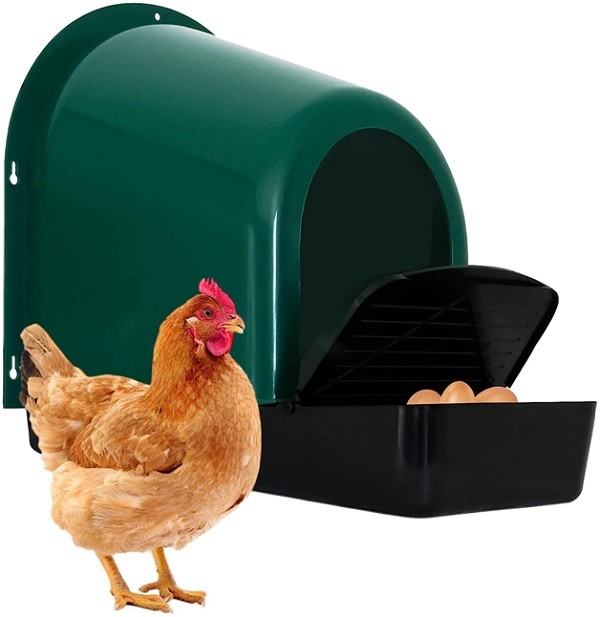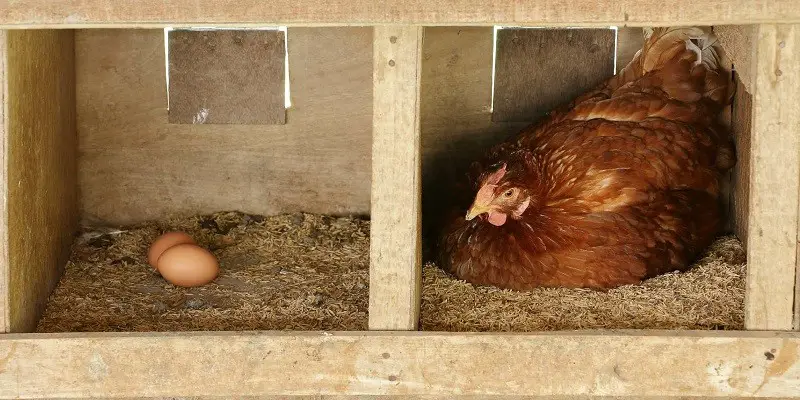Last Updated on January 14, 2025 by Pauline G. Carter
The chicken nesting boxes are a poultry keeper’s great secret weapon for ensuring happy hens and a seamless egg-laying experience. Top-notch nesting boxes provide a cozy and secure spot for your feathered friends to lay their eggs. Just leaving you with the great joy of a hassle-free egg collection.
No more searching for scattered eggs or dealing with cracked ones!
These boxes make life easier and egg gathering a great pleasure. Your hens will be less stressed and happier, resulting in a great boost to egg production.
If you’re a seasoned chicken keeper or just starting in the world of poultry farming, investing in the chicken nesting boxes will make a great and clucking difference!
How to pick the chicken nesting boxes?
Choosing the right chicken nesting boxes is essential for ensuring your hens’ comfort, productivity, and overall well-being. To help you make the decision for your flock, consider the following steps:
Assess Your Space and Flock Size:
Before buying nesting boxes, evaluate the available space in your chicken coop. Also, take into account the number of hens you have. Ensuring there’s enough space for each hen to lay comfortably is crucial.
Consider Nesting Box Size:

Opt for nesting boxes that are appropriately sized for your chicken breed. Generally, each nesting box should be around 12×12 inches in size, providing enough room for the hens to move around comfortably.
Prioritize Material Quality:
Choose nesting boxes made from durable materials, such as wood or plastic, that can withstand the wear and tear of daily use. The material should also be easy to clean and maintain.
Think About Nesting Box Design:
Look for nesting boxes with a design that offers privacy and security for your hens. Boxes with a low front opening and a higher back provide a sense of safety and encourage egg-laying.
Rollout Nesting Boxes vs. Traditional:
Decide between rollout nesting boxes and traditional designs. Rollout boxes allow eggs to roll away, reducing the chances of eggs getting cracked or soiled. Traditional designs, on the other hand, provide a more natural nesting experience for the hens.
Perch or No Perch:
Consider whether you want nesting boxes with perches. Perches can be beneficial as they allow hens to sit comfortably while laying eggs, but some hens may prefer not to use them.
Ease of Cleaning:
Choose nesting boxes that are easy to clean and maintain. Look for boxes with removable inserts or trays for straightforward cleaning.
Ventilation and Lighting:
Ensure the nesting boxes have proper ventilation to maintain a healthy environment inside the coop. Additionally, consider the lighting in the coop, as hens prefer darker areas for nesting.
Budget Considerations:
Set a budget and explore nesting box options within that range. While it’s essential to invest in quality nesting boxes, there are various options available to suit different budgets.
Read Reviews and Seek Recommendations:
Before making a final decision, read reviews from other chicken keepers and seek recommendations from experienced poultry enthusiasts. Their insights can provide valuable guidance.
By carefully considering these factors, you’ll be better equipped to pick the right chicken nesting boxes for your flock.
Benefits of using chicken nesting boxes
Using the chicken nesting boxes offers a plethora of benefits that enhance the overall well-being of your hens and streamline the egg-laying process. Here are some key advantages:
1. Comfortable and Secure Space:
The nesting boxes provide a cozy and secure environment for your hens to lay their eggs. This promotes a stress-free and comfortable experience, encouraging consistent egg-laying behavior.
2. Improved Egg Quality:
With the nesting boxes’ thoughtful design, eggs are protected from damage and kept clean. This leads to a higher percentage of pristine, farm-fresh eggs with fewer cracks or soiling.
3. Easy Egg Collection:
The inclusion of a convenient rollout feature simplifies egg collection. Eggs gently roll away from the nesting area, allowing for quick and effortless retrieval, saving you time and effort.
4. Reduced Egg Hunting:
When hens have designated nesting boxes, there’s less chance of them laying eggs in random places, reducing the need for egg hunting and potential egg wastage.
5. Hygienic and Manageable:
High-quality nesting boxes are often designed for easy cleaning and maintenance. This ensures a hygienic living space for your flock and simplifies coop management.
6. Happy and Productive Hens:
Comfortable nesting boxes lead to happy and contented hens. Happy hens tend to be more productive, resulting in a higher egg yield for you to enjoy.
7. Protecting Eggs from Predators:
The secure design of nesting boxes can help protect eggs from potential predators, ensuring a safer environment for your hens and their eggs.
8. Minimizing Egg Eating:
With nesting boxes, there’s a reduced likelihood of hens accidentally breaking their own eggs. This can help minimize egg-eating behavior in the flock.
9. Better Organization:
Nesting boxes offer a well-organized space for egg-laying, making it easier to keep track of egg production and potential issues.
10. Aesthetic Appeal:
Apart from their functional benefits, nesting boxes can enhance the overall look of your chicken coop, adding a touch of charm and elegance.
Final Thoughts
In conclusion, selecting the right chicken nesting boxes is a crucial decision that directly impacts your hens’ well-being and egg-laying performance. By following the steps mentioned above, you can confidently make an informed choice for your flock. Considering the available space, box size, and material quality will provide a comfortable and secure environment for your feathered friends.
The choice between rollout and traditional nesting boxes, along with the inclusion of perches, allows for customization to suit your hens’ preferences. Easy cleaning and proper ventilation contribute to maintaining a healthy coop, ensuring happy and healthy hens.
Don’t forget to share this article with your fellow poultry enthusiasts, so they too can make the choice for their cherished flocks.
Happy hens and abundant, farm-fresh eggs await!

